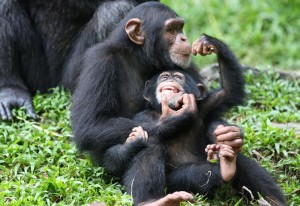World Chimpanzee Day is not merely a celebration; it’s a global call to action to protect and preserve one of humanity’s closest relatives. Sharing over 98% of our DNA, these intelligent primates hold a special place in the animal kingdom. Held annually on July 14, this day marks the anniversary of Jane Goodall’s first steps into the Gombe Stream National Park in Tanzania in 1960 – a journey that transformed our understanding of chimpanzees and underscored their profound connection to humans. Today, the day serves as a poignant reminder of the beauty and complexities of chimpanzees, as well as the urgent need to address the threats they face in the wild

Chimpanzees: Beyond Bananas and Laughter
Chimpanzees are much more than the playful figures often depicted in popular culture; they are creatures of profound complexity and intelligence. Highly social by nature, they form intricate communities known as troops, where each member displays a distinct personality. These communities are structured with deep social bonds and are capable of both cooperation and conflict, including organised “warfare” with rival groups.
Chimpanzees demonstrate remarkable cognitive abilities that rival those of humans in many ways. They use a variety of tools, crafted from sticks, stones, or other natural materials, to forage for food – such as using twigs to fish for termites or rocks to crack nuts. Their problem-solving skills are evident in how they adapt these tools and strategies to different challenges they encounter in the wild.
Moreover, chimpanzees exhibit behaviours that suggest a capacity for self-awareness and emotional depth. They experience and express a range of emotions, including joy, sorrow, and empathy, and have been observed mourning their dead. The groundbreaking research by Dr. Jane Goodall, which began in the 1960s, has been pivotal in unveiling these aspects of chimpanzees, demonstrating that the boundary between humans and animals is much less distinct than previously thought. Her work not only highlighted their intellectual and emotional faculties but also emphasised their individuality and the rich tapestry of their social interactions.
A Cause for Concern: Threats to Chimpanzees
Despite their critical ecological roles and close genetic ties to humans, chimpanzees are confronted with a high risk of extinction in the wild. The International Union for Conservation of Nature (IUCN) classifies chimpanzees as endangered, facing multiple severe threats that compound their decline. One significant threat is habitat loss; expanding human populations and agricultural activities are increasingly encroaching on chimpanzee habitats, leading to substantial reductions in their natural living spaces.
Another major challenge comes from the illegal wildlife trade, where young chimpanzees are frequently captured and sold as pets or tourist attractions – a practice that is not only illegal but also severely diminishes local populations. Additionally, in some regions, chimpanzees are hunted for bushmeat, which poses a critical threat to their survival.
Moreover, diseases transmitted from humans to chimpanzees, such as respiratory infections, have had devastating impacts on their populations, further threatening their existence in the wild. Each of these threats underscores the precarious situation of chimpanzees, emphasising the urgent need for concerted conservation efforts to ensure their survival.
Conservation Efforts: How We Are Trying to Save Chimpanzees
The global effort to protect chimpanzees has galvanised a diverse array of stakeholders, including conservationists, governments, and local communities, who are all working towards securing a future for these endangered primates.
- Sanctuaries and Rehabilitation Programmes: Across Africa, numerous sanctuaries provide safe havens and rehabilitation for rescued chimpanzees. Institutions like the Jane Goodall Institute’s Tchimpounga Chimpanzee Rehabilitation Centre in the Republic of Congo and the Chimpanzee Sanctuary and Wildlife Conservation Trust in Uganda offer these primates a second chance at life, free from the exploitation and dangers of the wild. These facilities not only provide care and rehabilitation but also work on reintroducing chimpanzees into secure environments where they can thrive.
- Legal Protections: On the legal front, international frameworks such as the Convention on International Trade in Endangered Species of Wild Fauna and Flora (CITES) play a pivotal role in combating the illegal trade of chimpanzees. These laws prohibit the commercial international trade of listed endangered species, including chimpanzees, thus helping to clamp down on the trafficking and ensuring that countries adhere to strict guidelines when handling wildlife trade.
- Habitat Conservation Projects: Protecting and restoring chimpanzee habitats is another critical area of conservation efforts. Projects like the Greater Mahale Ecosystem Conservation in Tanzania focus on creating and managing protected areas that not only preserve the natural habitats of chimpanzees but also promote sustainable land-use practices. These initiatives ensure the ecological integrity of these areas while also benefiting local communities through eco-tourism and subsistence activities that do not harm the environment.
- Public Education and Awareness: Educating the public about the challenges faced by chimpanzees is crucial for changing the behaviours that threaten their survival. Programs aimed at raising awareness and fostering a deeper understanding of the importance of chimpanzee conservation are essential. For instance, the World Chimpanzee Foundation conducts workshops and outreach programs that enlighten people about the critical role chimpanzees play in ecosystems and the urgent need to protect them.
On World Chimpanzee Day, we recognise the critical role of chimpanzees in our world and reaffirm our commitment to their survival and well-being. Their fate is intertwined with the health of ecosystems and ultimately with our own future on this planet. Let’s champion the cause of chimpanzees and ensure that they continue to thrive in the wild for generations to come. By protecting our closest relatives, we safeguard a key part of Earth’s biodiversity and our own shared heritage.
By Assaf Levy, BioDB

In Nigeria we have a chimpanzee sanctuary in Cross River State established in 1991 by the NGO Pandrillus. The Nigerian Chimpanzee Center at Drill Ranch is located in Boki LGA of Cross River State. It is one of the oldest sanctuaries in Africa.